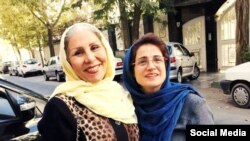Mahvash Sabet, a leader of Iran’s Baha’i community, has been released from prison after serving an outrageous 10-year term because of the peaceful practice of her religion. A decade ago, six other Baha’i leaders and co-defendants of Ms. Sabet were also charged with national security crimes, including espionage, on account of their religious beliefs. They are expected to be released in the coming months when their 10-year sentences have been completed.
Speaking to the Center for Human Rights in Iran after her release, Ms. Sabet said the Iranian authorities presented no evidence against any of the Baha’i leaders. ”We love our country,” she said. “We never betrayed our country and never will.” She praised the Baha’is’ defense lawyers – Abdolfattah Soltani and Hadi Esmailzadeh -- who were later imprisoned for their legal work on behalf of political prisoners. They were Muslims, she noted. “What mattered to them was that their clients were human beings and citizens of this country, just like them,” she said.
The Baha’is are one of the most persecuted religious minorities in Iran. They are barred from universities unless they renounce their faith; their marriages are not recognized by the government; their businesses are arbitrarily shut down; their cemeteries desecrated; they are physically attacked because of their religion.
But the Baha’i community is one of many--including other religious and ethnic minorities, human rights defenders, journalists, women’s rights campaigners, labor rights leaders, and open internet advocates -- whose freedoms are being trampled by the Iranian regime. As President Donald Trump has said, Iran’s leaders have shown they are more interested in exporting terror and destabilizing their neighbors than allowing Iranian citizens to exercise their fundamental human rights:
“The longest-suffering victims of Iran’s leaders, are, in fact, its own people…Iran’s government must stop supporting terrorists, begin serving its own people, and respect the sovereign rights of its neighbors.”
President Trump noted, however, that “[o]ppressive regimes cannot endure forever,” and predicted that the day will come when the Iranian people will be able to choose to “return to the nation’s proud roots as a center of civilization, culture, and wealth -- where [the] people can be happy and prosperous once again.”












